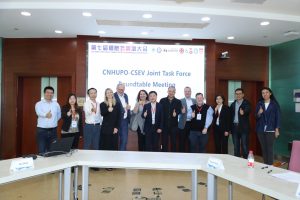Extracellular Vesicle Proteome and the π-HuB Project

On September 25th, 2023, “The Proteomic Navigator of the Human Body (the π-HuB Project): The Road to Phronesis Medicine” was officially initiated. As announced by the China Human Proteome Organization (CNHUPO), the π-HuB Project is an international project supported by Chinese MOST, aimed to characterize the entire lifetime human proteome (the complete set of proteins encoded by a particular genome) systematically, decipher the nature and rebuild an epoch-breaking digital human body navigation system, and subsequently create the new paradigm of the Phronesis Medicine. Meanwhile, a CNHUPO task force of extracellular vesicles (EVs) was organized to bring EV proteome into the navigation system proposed by π-HuB.
EVs are non-replicating vesicles with bilipid layer structure that are secreted from virtually all cell types. With such characteristics, gigantic amount of evidence has been published, favoring that EVs can carry unique proteomes that can be traced back to human tissues. This makes EV proteome an important navigator for physiological and pathological conditions of human body that fits the aim of π-HuB. Until November, 2023, more than 3500 publications focusing on EV proteome can be found in public databases. With the above background, on October 21st, CNHUPO and Chinese Society of EVs (CSEV) held a joint task force roundtable meeting for EV proteome at the conference center of Shanghai General Hospital, Shanghai Jiaotong University School of Medicine, China.
This meeting was co-chaired by Professor Tong Wang, Jinan University, Council Member of CNHUPO, Deputy Chair of CSEV, and Professor Lei Zheng, Nanfang Hospital Southern Medical University, Executive Deputy Chair of CSEV, Editor-in-Chief of the journal of Interdisciplinary Medicine. Numerous leading scientists and early career researchers participated this meeting. They included Professor Jan Lotvall, Past President of International Society of EVs (ISEV); Professor Andrew Hill, Past President of ISEV; Professor Metka Lenassi, Chair of ISEV Science and Meetings Committee; Professor Ana Claudia, Chair of ISEV Communications and Membership Committee; Professor Qin Zhang, Vanderbilt University Medical Center, United States; Professor Xiaobo Yu, National Center for Protein Sciences, China; Professor Hang Yin, Tsinghua University, China; Professor Andrea Moller, The Chinese University of Hong Kong, China; Professor Qingling Fu, Sun Yat-sen University, China; Professors Fuquan Yang and Hu Zhou from Chinese Academy of Science, China; Professor Lianghai Hu, Jilin University, China; Dr. Bo Li, Nanfang Hospital Southern Medical University; Dr. Yizhi Cui, Jinan University; and Dr. Weina Gao, Southern University of Science and Technology, China.
First, on behalf of Professor Qian Wang, Chair of CSEV, Professor Lei Zheng gave a welcome speech and summarized the advances of EV proteome researches and translational medicine in the framework of CSEV. He also insightfully addressed the necessity and feasibility of integrating these advances into the π-HuB project.
On behalf of Professor Ping Xu, Chair of CNHUPO, Professor Xiaobo Yu, Deputy Secretary General, systematically introduced the specific aims, scientific questions and significance of the π-HuB project. Meanwhile, scientists specifically discussed the valuable philosophy in depth regarding proteome navigators for human life-span and diseases. In addition, numerous practical topics were covered by this panel discussion in terms of quality control for mass spectrometry, biobanking and multi-center platform co-ordinations.
Then, Professor Tong Wang gave a talk on the advances of EV proteome in human major diseases, in which he emphasized that to use EV proteome as a navigator for human healthy and disease conditions, it is critical to have standardized method for clinical isolation of EVs. He also proposed multicenter investigations on EV proteomes, and hosted further discussions on target disease selection at this initiation stage of π-HuB.
Professor Jan Lotvall emphasized critical factors for EV proteome researches, including sample type considerations, biobanking conditions and isolation method selection. Professor Metka Lenassi agreed with other scientists that it was a feasible start-point to analyze the plasma EV proteome with large-scale samples from healthy cohort subjects of different races/regions that can serve as a baseline of human health conditions. Furthermore, she suggested to organize a focused ISEV meeting to specifically evaluate variations introduced during sample collection, biobanking and freeze-thaw in the near future. In addition, Professor Andrew Hill suggested to include aging and Alzheimer disease to the EV proteome π-HuB framework as they represent important end-points of human life-span. Other scientists also gave very important suggestions and expressed their opinions.
All scientists reached consensus that π-HuB is a valuable and strategic project and it is of great scientific and clinical significance to have EV proteome in this project.